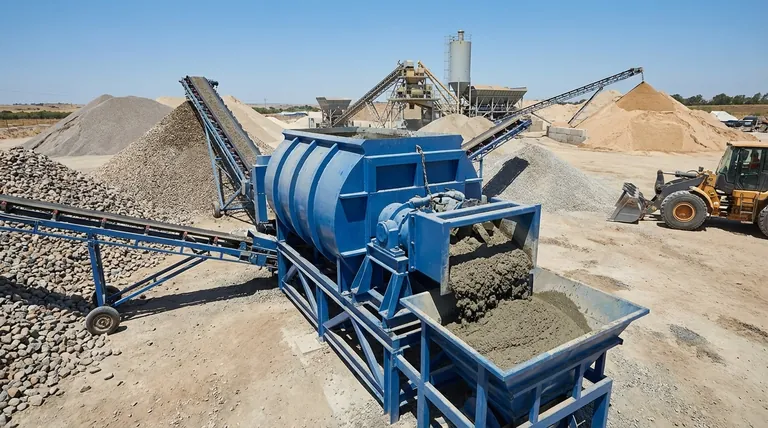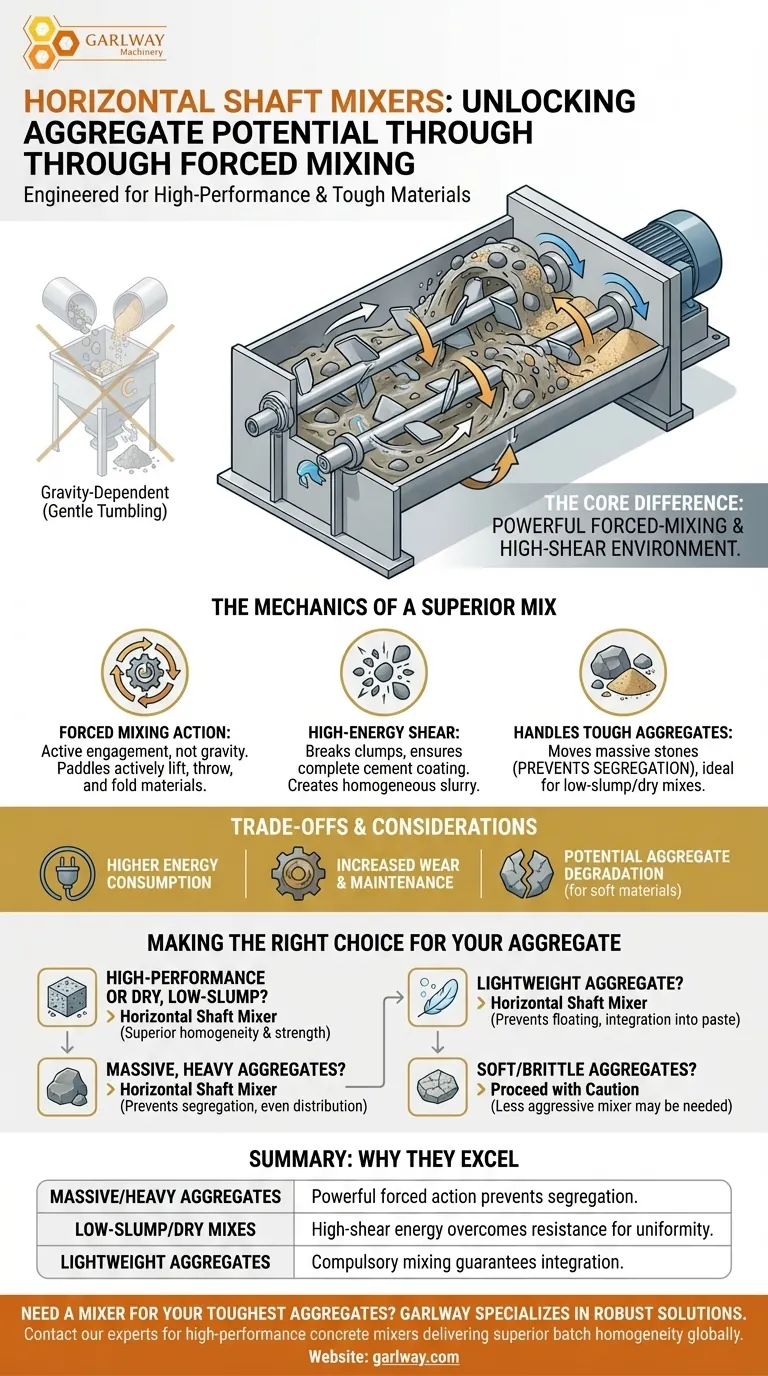At its core, a horizontal shaft mixer's suitability for specific aggregates stems from its powerful, forced-mixing action. Unlike gravity-dependent mixers, its rotating shafts and paddles create an intense, high-shear environment that can homogenize a wide range of materials, especially challenging ones like lightweight, dry, or massive aggregates.
The key difference is a shift from gentle tumbling to an energetic, compulsory mixing. This mechanical force guarantees that every particle is actively folded and sheared into the mixture, achieving a level of uniformity that is difficult to reach with other methods, particularly for low-slump and specialized concretes.

The Mechanics of a Superior Mix
To understand why this design excels, we must look at the physical principles at work inside the mixing drum. The effectiveness is not accidental; it is a direct result of its engineering.
Forced Mixing Action
A horizontal shaft mixer does not rely on gravity to let materials fall over each other. Instead, paddles or blades are mounted on one or more horizontal shafts that spin at high speed, actively forcing the materials to interact.
This creates a "compulsory" or "forced" mix, where aggregates, cement, and water are constantly being lifted, thrown, and folded together.
High-Energy Shear and Homogeneity
The intense movement of the paddles through the material generates high shear forces. This action is critical for breaking down any clumps of cement and ensuring that each individual aggregate particle is completely and evenly coated with cement paste.
The result is a highly homogeneous slurry with consistent properties throughout the batch, which is vital for high-performance concrete.
Handling Massive and Unusually Shaped Aggregates
The powerful mechanical action is strong enough to lift and move very large or massive aggregates. This prevents the segregation that can occur in less energetic mixers, where heavier stones might settle at the bottom.
The forced movement ensures these large components are evenly distributed within the mix.
Ideal for Low-Slump and Dry Mixes
"Dry hard concrete," also known as low-slump concrete, has very little water and does not flow easily. It resists mixing and requires significant energy to achieve a uniform consistency.
The high-energy, forced action of a horizontal shaft mixer is perfectly suited to overcome this resistance, making it the preferred choice for these demanding applications.
Understanding the Trade-offs
While highly effective, the design of horizontal shaft mixers presents a specific set of operational considerations that are important for any user to understand.
Higher Energy Consumption
The powerful motor and drivetrain required to create such an intense mixing action consume significantly more energy than simpler, gravity-based drum mixers.
Increased Wear and Maintenance
The high shear forces and constant abrasion from aggregates cause faster wear on internal components like the mixing paddles and drum liners. This necessitates a more rigorous and costly maintenance schedule.
Potential for Aggregate Degradation
The same forceful action that creates a superior mix can sometimes be too aggressive. For softer or more friable aggregates, the high-energy mixing can fracture the particles, altering the aggregate gradation and potentially impacting the final concrete properties.
Making the Right Choice for Your Aggregate
Your decision should be based directly on the type of material you are working with and the final properties you need to achieve.
- If your primary focus is high-performance or dry, low-slump concrete: The horizontal shaft mixer is the superior choice for achieving the required homogeneity and strength.
- If your primary focus is mixing large, heavy, or massive aggregates: Its powerful, forced action is essential to prevent segregation and ensure uniform distribution.
- If your primary focus is lightweight aggregate concrete: The compulsory mixing prevents lighter materials from floating and guarantees they are evenly integrated into the paste.
- If your primary focus is standard concrete with soft or brittle aggregates: You should proceed with caution, as a less aggressive mixer may be necessary to preserve the integrity of the material.
Ultimately, choosing a horizontal shaft mixer is a commitment to performance where the material demands energetic and precise control.
Summary Table:
| Aggregate Type | Why Horizontal Shaft Mixers Excel |
|---|---|
| Massive/Heavy Aggregates | Powerful forced action prevents segregation and ensures even distribution. |
| Low-Slump/Dry Mixes | High-shear energy overcomes resistance to create a uniform, high-performance mix. |
| Lightweight Aggregates | Compulsory mixing prevents floating and guarantees integration into the paste. |
Need a mixer that can handle your toughest aggregates? GARLWAY specializes in robust construction machinery, including horizontal shaft mixers designed for high-performance concrete. Our mixers deliver the forced-mixing action essential for heavy, dry, or lightweight aggregates, ensuring superior batch homogeneity and project success for construction companies and contractors globally. Contact our experts today to find the perfect solution for your specific material challenges!
Visual Guide

Related Products
- Shaft Mixer Machine for Cement and Regular Concrete Mixing
- HZS90 Large Multiquip Concrete Mixers for Construction
- Auto Concrete Cement Mixer Machine New
- Commercial Construction Mixer Machine for Soil Cement Mixing Concrete
- Ready Mixer Machine for Construction Ready Mix Machinery
People Also Ask
- What are the advantages of twin-shaft mixers? Achieve Unmatched Mixing Efficiency & Quality
- What are the features and applications of twin-shaft mixers? Maximize Your Concrete Production Speed & Quality
- What are some future trends and innovations in cement blending equipment? Smart, Sustainable, and Connected Solutions
- What are the advantages and disadvantages of a twin shaft mixer? Unmatched Mixing Quality for High-Volume Production
- What factors should be considered when selecting cement blending equipment? A Guide to Maximizing ROI














